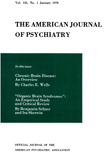Families of manic-depressive patients: effect of treatment
Abstract
The authors studied the families of 12 patients with bipolar manic- depressive illness. They measured family stability using a life events scale for a 2-year period before lithium treatment and for 2 years during lithium treatment. The patients responded well to treatment; they were able to resume normal roles within the family. The life events scores decreased substantially during treatment in comparison with before treatment. The most severe impact of the illness was found in the children: 45% (N = 10) were moderately ill or symptomatic. The authors discuss the effect of manic-depressive illness on the family system as a whole and emphasize the need to combine psychosocial treatment with lithium treatment.
Access content
To read the fulltext, please use one of the options below to sign in or purchase access.- Personal login
- Institutional Login
- Sign in via OpenAthens
- Register for access
-
Please login/register if you wish to pair your device and check access availability.
Not a subscriber?
PsychiatryOnline subscription options offer access to the DSM-5 library, books, journals, CME, and patient resources. This all-in-one virtual library provides psychiatrists and mental health professionals with key resources for diagnosis, treatment, research, and professional development.
Need more help? PsychiatryOnline Customer Service may be reached by emailing [email protected] or by calling 800-368-5777 (in the U.S.) or 703-907-7322 (outside the U.S.).



